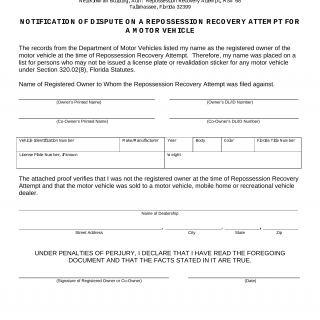Form HSMV 86065. Notification of Dispute on a Repossession Recovery Attempt for a Motor Vehicle - Florida
Form HSMV 86065 is used in Florida to notify the Department of Highway Safety and Motor Vehicles (DHSMV) about a dispute arising during a repossession recovery attempt of a motor vehicle. This form allows individuals involved in the repossession process, such as the debtor or the repossessor, to provide details about the dispute and request assistance from the DHSMV.
The form consists of sections and important fields, including:
- Notification Details: This section requires information about the motor vehicle, including the make, model, year, vehicle identification number (VIN), license plate number, and a description of the dispute.
- Identification of Parties: Here, the form includes fields to identify the parties involved in the repossession, such as the debtor (vehicle owner), the repossessor (person or company attempting the repossession), and any other relevant individuals or entities.
- Description of Incident: The form allows the person completing it to provide a detailed description of the dispute, including the circumstances leading to the repossession attempt and the issues that arose during the process.
- Signature: The person completing the form signs it, indicating their authorization and agreement with the information provided.
When filling out this form, it is crucial to provide accurate and detailed information regarding the dispute and the repossession attempt. It is recommended to gather any supporting documentation or evidence related to the incident. The form should be signed to confirm the authenticity of the information provided.
An alternative form related to this is Form HSMV 85993, which is the Complaint Affidavit for Unlawful Repossession or Illegal Possession of a Motor Vehicle. While Form HSMV 86065 focuses on notifying the DHSMV about a dispute during a repossession recovery attempt, Form HSMV 85993 is used to file a formal complaint regarding unlawful or illegal repossession or possession of a motor vehicle. The main difference lies in the purpose and scope of the forms.

